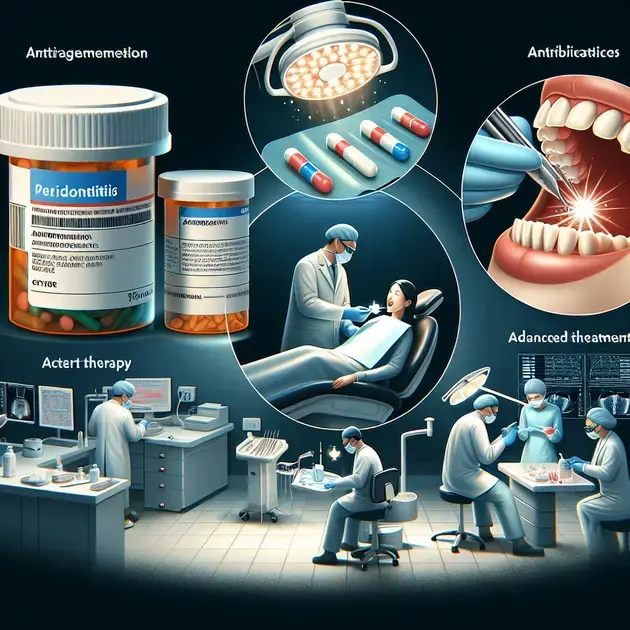Periodontitis is a serious gum infection that damages the soft tissue and destroys the bone that supports your teeth. If left untreated, it can lead to tooth loss and other health problems. In this comprehensive guide, we will explore the most effective medication options available to treat periodontitis.
With advancements in dental research and technology, there are now multiple treatment options for periodontitis that have shown promising results in combating the disease. From antibiotics to surgical interventions, this guide will provide you with valuable insights into the most effective medication for periodontitis.

Understanding Periodontitis Medication
Introduction to Periodontitis Medication
Periodontitis is a severe gum infection that can lead to tooth loss and other complications if left untreated. Understanding the medication options available for treating periodontitis is crucial for effectively managing the condition. One of the key factors in choosing the right treatment is knowing the different types of medications commonly used to combat periodontitis.
Common Medications for Periodontitis
Antibiotics are often prescribed to treat periodontitis, either in pill form or as a mouth rinse. Some common antibiotics used to combat the infection include doxycycline, minocycline, and metronidazole. These medications work by killing the bacteria causing the infection and reducing inflammation in the gums. Your dentist or periodontist may recommend a specific antibiotic regimen based on the severity of your condition.
Guidelines for Using Periodontitis Medication
It’s essential to follow your healthcare provider’s instructions carefully when taking medication for periodontitis. Make sure to take the full course of antibiotics prescribed, even if your symptoms improve before the medication is finished. Skipping doses or stopping treatment early can lead to antibiotic resistance and an increased risk of recurring infections.
Side Effects and Risks
Like any medication, antibiotics used to treat periodontitis can have side effects. Common side effects may include nausea, vomiting, diarrhea, or allergic reactions. It’s essential to discuss any concerns or side effects with your healthcare provider promptly. In rare cases, antibiotics may also interact with other medications you are taking, so be sure to inform your healthcare provider of all medications you are currently using.
Monitoring Progress and Adjusting Treatment
Regular check-ups with your dentist or periodontist are essential to monitor the progress of your periodontitis treatment. Based on your response to medication and the condition of your gums, your healthcare provider may recommend adjustments to your treatment plan. It’s crucial to communicate any changes or concerns with your healthcare provider to ensure the most effective treatment outcomes.
Key Factors in Choosing the Right Treatment
Evaluating the Severity of Periodontitis
The first step in choosing the right treatment for periodontitis is evaluating the severity of the condition. Your dentist or periodontist will assess the extent of gum disease, including measuring the depth of periodontal pockets and evaluating the amount of bone loss. Based on this evaluation, your healthcare provider will recommend a treatment plan tailored to your specific needs.
Considering Non-Surgical Treatments
In many cases, non-surgical treatments such as scaling and root planing (deep cleaning) can effectively manage periodontitis. This procedure involves removing plaque and tartar from the surfaces of the teeth and root surfaces to promote gum healing. Non-surgical treatments are often recommended as the first line of defense against periodontitis before considering surgical options.
Exploring Surgical Interventions
If non-surgical treatments are not effective in managing periodontitis, surgical interventions may be necessary. Surgical options for treating periodontitis include flap surgery, bone grafts, and tissue regeneration procedures. Your periodontist will discuss the benefits and risks of each surgical option and help you choose the most appropriate treatment based on your individual needs.
Long-Term Maintenance and Follow-Up Care
Once you have completed your periodontitis treatment, it’s essential to maintain good oral hygiene practices and attend regular dental check-ups. Periodontitis is a chronic condition that requires ongoing management to prevent recurrence. Your healthcare provider may recommend professional cleanings every few months to monitor the health of your gums and prevent further complications.
Exploring Surgical Options
Understanding the Role of Surgical Interventions
Surgical options for treating periodontitis are typically recommended when non-surgical treatments have not effectively controlled the infection. Flap surgery, also known as pocket reduction surgery, involves lifting the gums to remove tartar deposits and reduce the depth of periodontal pockets. This procedure aims to eliminate bacteria and promote gum healing.
Benefits and Risks of Surgical Interventions
Surgical interventions for periodontitis can help restore gum health and prevent further damage to the teeth and supporting structures. However, like any surgical procedure, there are risks involved, including infection, bleeding, and prolonged healing times. It’s essential to discuss the benefits and risks of surgical options with your healthcare provider to make an informed decision about your treatment plan.
Post-Surgical Care and Recovery
Following surgical treatment for periodontitis, it’s crucial to follow your healthcare provider’s instructions for post-operative care. This may include taking prescribed medications, using a special mouthwash, and avoiding certain foods or activities that could interfere with healing. Attend all scheduled follow-up appointments to monitor your progress and ensure proper healing of the surgical site.
Long-Term Outcomes and Maintenance
After undergoing surgical treatment for periodontitis, maintaining good oral hygiene practices is key to preventing recurrence of the infection. Brush and floss regularly, use an antimicrobial mouth rinse as recommended, and attend regular dental check-ups. Your healthcare provider may recommend periodic evaluations to monitor the health of your gums and adjust your treatment plan as needed.

Factors to Consider in Periodontitis Medication Selection
When selecting medication for periodontitis, there are several key factors to consider to ensure the most effective treatment. One important factor is the severity of the patient’s condition. The medication chosen should match the stage of periodontitis the patient is experiencing, whether it be mild, moderate, or severe.
Another factor to consider is the patient’s medical history and any potential drug interactions. It is crucial to review the patient’s medical records and current medications to avoid any adverse effects or complications.
The cost of the medication is also an important consideration. While effectiveness is paramount, affordability plays a significant role in ensuring the patient can adhere to the treatment plan. Discussing cost-effective options with the patient can help in making the right medication selection.
Furthermore, the mode of administration should be taken into account. Some patients may have difficulty with certain forms of medication, such as pills or injections. Choosing a medication that is convenient and easy for the patient to use can improve compliance.
Lastly, it is essential to consider the potential side effects of the medication. Educating the patient on what to expect and how to manage any side effects can enhance the overall treatment experience.
Maximizing the Effectiveness of Periodontitis Treatment
To maximize the effectiveness of periodontitis treatment, a comprehensive approach is key. This includes regular dental check-ups and cleanings to monitor the progress of the treatment and address any issues promptly.
Proper oral hygiene practices are crucial in enhancing the effectiveness of treatment. Brushing and flossing regularly can help prevent the progression of periodontitis and maintain overall oral health.
Dietary habits also play a significant role in the effectiveness of treatment. Encouraging a balanced diet rich in essential nutrients can support the healing process and strengthen the immune system.
In addition, lifestyle factors such as smoking and alcohol consumption can impact the effectiveness of treatment. Advising the patient to quit smoking and reduce alcohol intake can significantly improve treatment outcomes.
Regular communication between the patient and the dental care team is vital in maximizing treatment effectiveness. Addressing any concerns or questions the patient may have can ensure they are fully engaged in their treatment plan.
Exploring Advanced Treatment Options
For patients with severe or complex cases of periodontitis, exploring advanced treatment options may be necessary to achieve optimal results. One advanced treatment option is laser therapy, which can target and remove infected tissue more precisely than traditional methods.
Surgical interventions, such as flap surgery or bone grafting, may be recommended for patients with advanced periodontitis to restore damaged tissue and promote gum and bone regeneration.
Another advanced treatment option is the use of antimicrobial agents, such as local antibiotics, to target and eliminate specific bacteria contributing to periodontal disease.
Regenerative procedures, such as guided tissue regeneration or enamel matrix derivatives, can also be considered to promote the growth of new bone and tissue in areas affected by periodontitis.
Combining advanced treatment options with ongoing periodontal maintenance can help patients achieve long-term success in managing and treating periodontitis.
**
Conclusion
**
When selecting medication for periodontitis, it is crucial to consider various factors to ensure effective treatment. The severity of the patient’s condition, medical history, potential drug interactions, cost, mode of administration, and possible side effects all play significant roles in choosing the most suitable medication. By aligning these factors with the patient’s specific needs, healthcare providers can optimize the treatment outcome and enhance patient compliance.
Maximizing the Effectiveness of Periodontitis Treatment
A comprehensive approach to periodontitis treatment is essential for maximizing effectiveness. Regular dental check-ups, proper oral hygiene practices, a balanced diet, and lifestyle modifications like quitting smoking and reducing alcohol intake are all integral aspects of enhancing treatment outcomes. Effective communication between patients and dental care teams ensures that concerns are addressed promptly, leading to a more engaged approach to treatment and better results in managing periodontitis.
Exploring Advanced Treatment Options
For patients with severe or complex periodontitis cases, advanced treatment options such as laser therapy, surgical interventions, antimicrobial agents, and regenerative procedures offer promising solutions. These advanced techniques target specific issues more precisely, promote tissue regeneration, and combat bacteria contributing to periodontal disease. By combining these advanced treatment options with regular periodontal maintenance, patients can achieve long-term success in managing and treating periodontitis effectively.



